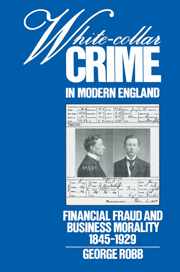Book contents
- Frontmatter
- Contents
- List of tables
- Acknowledgments
- Introduction: White-collar crime and the criminal “upperworld”
- 1 The new economy: transformation of finance and opportunities for crime
- 2 The Railway Mania
- 3 Banking and credit fraud
- 4 Stock fraud
- 5 Company fraud: promotion
- 6 Company fraud: management
- 7 Company law and the courts
- 8 Business ethics and professionalization
- Conclusion: Final considerations
- Notes
- Bibliography
- Index
Conclusion: Final considerations
Published online by Cambridge University Press: 08 December 2009
- Frontmatter
- Contents
- List of tables
- Acknowledgments
- Introduction: White-collar crime and the criminal “upperworld”
- 1 The new economy: transformation of finance and opportunities for crime
- 2 The Railway Mania
- 3 Banking and credit fraud
- 4 Stock fraud
- 5 Company fraud: promotion
- 6 Company fraud: management
- 7 Company law and the courts
- 8 Business ethics and professionalization
- Conclusion: Final considerations
- Notes
- Bibliography
- Index
Summary
Victorian England witnessed the birth of a new, industrial economy and a financial structure characterized by individual shareholdings in joint-stock corporations. By the end of the nineteenth century, the British had invested several billion pounds in company shares, or roughly two-fifths of total national wealth. This level of shareholding had no parallel in the world, amounting to more than twice the sum of French and German company investment combined. Corporate organization facilitated British domination of the world economy and enriched many members of the investing public; yet this novel and peculiar form of economic arrangement also proved vulnerable to abuse. White-collar crime was the soft underbelly of the modern British economy, robbing the public of millions of pounds, undermining trust in commercial integrity and depressing the level of investment in new industries.
A number of structural and ideological factors combined to create a climate favorable to corporate fraud in nineteenth-century England. The divorce of ownership from control in large companies increased the distance between shareholders and directors and heightened the impersonality of the relationship. Directors held vast sums of money in trust for investors, and the temptation to misappropriate or misapply that money was at times irresistible. The primitive nature of accountancy and auditing made fraud difficult to discover and the complexity of modern finance blurred the boundaries between crime and misadventure. The entrepreneurial culture of Victorian England bred aggressive businessmen who were impatient with ethical codes and whose preoccupation with material success led them to fear failure more than fraud. A laissez-faire mentality and an emphasis on individual responsibility discouraged state intervention to protect shareholders.
- Type
- Chapter
- Information
- White-Collar Crime in Modern EnglandFinancial Fraud and Business Morality, 1845–1929, pp. 181 - 191Publisher: Cambridge University PressPrint publication year: 1992



